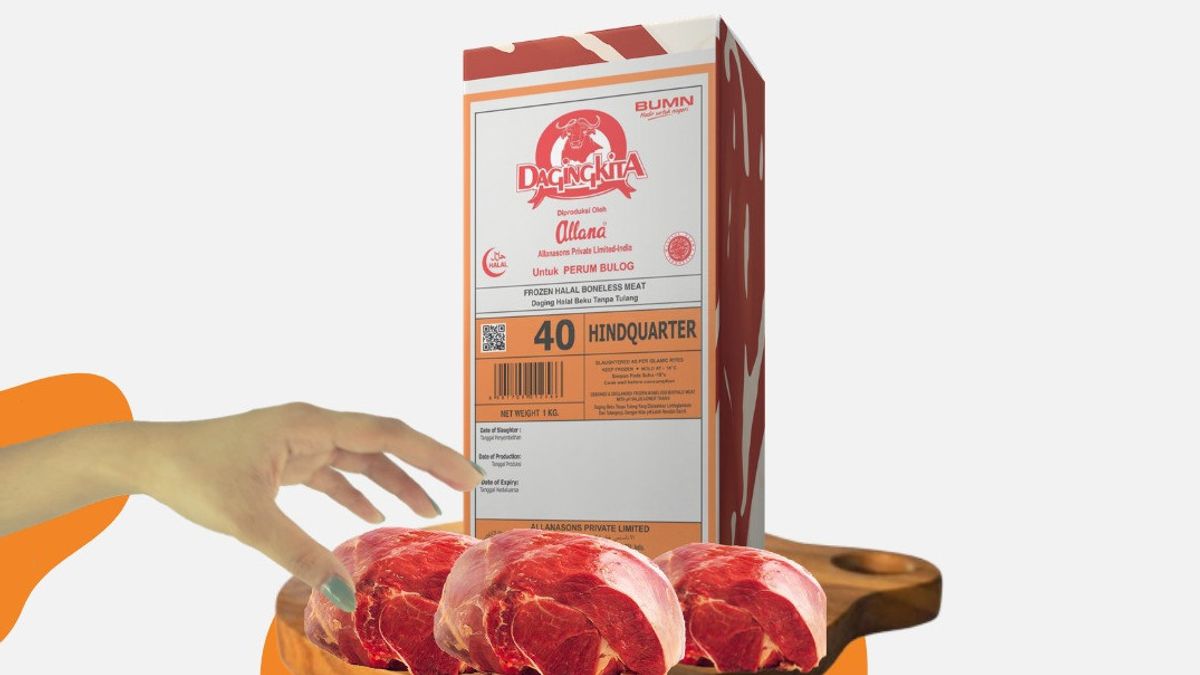JAKARTA - Agricultural observer of the Indonesian Political Economy Association (AEPI) Khudori said, approaching Eid which is only a matter of fingers, the price of fresh beef in the market is still quite high. Where, based on the data, it is close to Rp. 150,000 per kilogram (Kg), compared to the previous Rp. 120,000 per kg.
"When discussing with meat associations, it is very possible that, approaching Eid, the price of fresh beef will increase to Rp. 180,000 per kg," he said when contacted by reporters, quoted on Thursday, April 28.
This is due to a number of factors. Starting from the insufficient domestic supply and the high price of meat from exporting countries.
"So, I'm not surprised, if now the price of beef is high," he said.
Therefore, for people who cannot buy fresh beef, the government has provided frozen buffalo meat as an alternative.
Where, throughout this year Perum Bulog received an assignment from the government to import 100,000 tons of frozen buffalo meat.
Judging from the existing data, said Khudori, the average monthly demand for meat is 8,000 to 10,000 tons. Meanwhile, Bulog's stock is 36,000 tons.
"That is, the stock of buffalo meat is still sufficient, not even just for Eid, but enough to meet the needs of meat until May and June," he explained.
He believes that with the availability of sufficient stock, people can celebrate Eid al-Fitr by enjoying an equally delicious meal. Moreover, the price of frozen buffalo meat is cheaper and affordable, which is Rp. 80,000, compared to fresh beef.
"So, there is still a choice of buffalo meat, as an alternative. Of course, there are still consumers, there are enthusiasts, even though it's not as big as (consumers) beef," he said.
He further conveyed, the government began to carry out imports of frozen buffalo meat in 2017. With the consideration, so that the price of beef can drop to Rp. 80,000, depending on the type. This price also refers to the Regulation of the Minister of Trade (Permendag) No. 7 of 2020.
Therefore, the government is trying to find alternatives to meat that are cheaper.
"Buffalo meat was found. The potential is from India. However, since 2017 the price of fresh beef has never been reached according to that reference," he said.
This is because, the price of beef is already expensive from the country of origin. Likewise, meat from local production and feeder cattle, which are raised and slaughtered domestically.
Not to mention, when the beef cattle fattening industry (feedloter) annually procured feeder cattle, the number also continued to decline, even before the COVID-19 pandemic occurred.
According to him, with these conditions, the supply of meat is expected to be met from local cattle. Where, many people raise 3-4 cows, even though it's not their main job.
Unfortunately, they treat cows as liquid property. So, if there is no important and urgent need, they do not necessarily want to sell the cows. However, ahead of Eid the price goes up.
"Actually, there are a lot of cows that are ready to be slaughtered, but they are not marketable. Not every time they can enter the market. I think that also causes limited stock and makes the price high," he explained.
In addition, the Government has also mobilized cattle from centers in East Java and West Nusa Tenggara (NTB). In particular, to meet the demand for meat in Greater Jakarta and Greater Bandung, where consumption needs are high.
"But, from the mobilization, we can see that the results are also not much. So, everything fits, domestic supply cannot cover the need, then the price of imported meat is high. Now, the price is also high," he concluded.
The English, Chinese, Japanese, Arabic, and French versions are automatically generated by the AI. So there may still be inaccuracies in translating, please always see Indonesian as our main language. (system supported by DigitalSiber.id)










